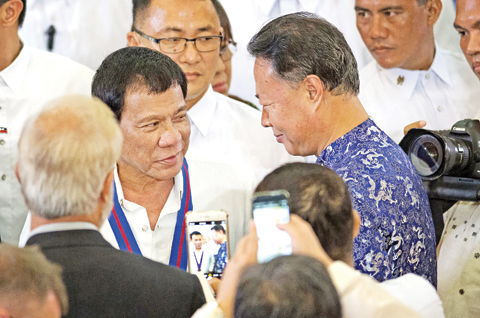'Community Drugs Watch'
 MANILA: This file picture taken on August 17, 2016 shows Philippine President Rodrigo Duterte (L) talking to Chinese Ambassador to the Philippines Zhao Jianhua during the 115th Police Service Anniversary at the Philippine National Police (PNP) headquarters. — AFP
MANILA: This file picture taken on August 17, 2016 shows Philippine President Rodrigo Duterte (L) talking to Chinese Ambassador to the Philippines Zhao Jianhua during the 115th Police Service Anniversary at the Philippine National Police (PNP) headquarters. — AFP
CLARK, Philippines: With a son addicted to methamphetamine and dealers and users winding up dead in a spree of killings in the Philippines, Emerciana Ybote was keen to be on the right side of President Rodrigo Duterte's bloody drugs war.
The 51-year-old housewife is among 9,000 women in one Philippine province who have formed a "Community Drugs Watch" to keep an eye on families and steer addicted relatives away from the danger zone and towards rehabilitation.
More than 6,000 people have been killed since Duterte took office in July and unleashed his promised crackdown, with a third of the deaths at the hands of police and the rest still under investigation. Many of the unsolved cases are assumed to be vigilante killings, which Duterte has refused to condemn. "Of course we heard about the killings, so we are telling our own families to stay away and we will look after them," she said. "My son is now reformed. I don't want him to get back to the bad habit, so I am here."
Duterte's justification against a tide of international condemnation is that "shabu", as the methamphetamine is known, is tearing apart families and threatening the next generation. Critics see that as ironic and say his drugs war has devastated communities and created a climate of fear.
That sentiment was shown by an opinion poll published on Monday, in which eight out of 10 Filipinos said they feared they or people they knew could become victims of extrajudicial killings. Thousands of wives attended a ceremony Duterte oversaw yesterday at a former US military base north of Manila and took an oath to support his drugs war at community level.
Evangeline Alvarez, 46, ignored her husband's advice to not get involved in a crusade by Duterte that numerous critics have argue impacts innocent, disenfranchised addicts as much as the dealers it was supposed to target.
Her younger brother was among hundreds of thousands of so-called "surrenderers" who have reported their addiction to the authorities and sought treatment. "My husband told me to stay away from the anti-drug activities because it's too risky," she said. "But my fear is losing my brother, so I have to join this fight."
The governor of Pampanga province, Lilia Pineda, said the mothers' movement was a more humane solution to curb drugs and would prevent the need for bloodshed. "They will be our potent weapon," she added.-Reuters

